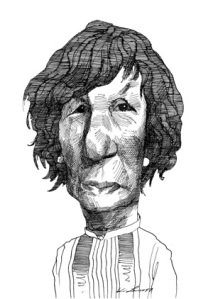
Patronatskind No 18

J. M. Coetzee
Disgrace
Vintage
Schande
S. Fischer
Weder zu Coetzee noch speziell zu Disgrace kann ich selbst an diesem Punkt etwas sagen, anders als dass es vom Buchpatron empfohlen wird und ich es möglichst noch vor Ablauf dieses Jahres lesen möchte.
Dies sagt der S. Fischer Verlag zum Buch, das dort in einer hübschen kleinen Sonderausgabe in der Übersetzung von Reinhild Böhnke erschienen ist:
„Davie Lurie, Literaturprofessor in mittleren Jahren und zweimal geschieden, ist in Ungnade gefallen: eine Affäre mit einer seiner Studentinnen ist an die Öffentlichkeit gedrungen. Der peinlichen Befragung entzieht er sich durch ein Schuldbekenntnis. Er quittiert seinen Dienst und verläßt Kapstadt, um für eine Weile zu seiner Tochter aufs Land zu ziehen. Lucy, die keinerlei Ambitionen in der Welt ihres Vaters hat, versucht auf einem entlegenen Stück Land eine kleine Farm aufzubauen. Zunächst scheint es, als könnten der Einfluss Lucys und der natürliche Rhythmus des Farmlebens Davids aus den Fugen geratenem Leben neuen Halt geben, doch dann werden Vater und Tochter Opfer eines brutalen Überfalls, in dessen Folge der grundlegende existentielle Konflikt zwischen beiden offen zutage tritt.
Ausgezeichnet mit dem Booker-Preis 1999″
Reading along the NYRB
50 Years New York Review Of Books 50 Years

Several articles over the years refer to the writings of J. M. Coetzee, and David Levine, the late ingenious artist of that great paper of thought and literature, rendered this portrait in 1997.
Ian Buruma, in „Portrait of the Artist“, wrote about „Disgrace“:
„Life in the veld, and its intimately brutal social relations, provide some of the most memorable passages in Coetzee’s fiction: the marvelous evocation in Disgrace of a young white woman trying to live a rural idyll among black farmers in the post-apartheid years, […]“
Tim Parks, in „The Education of ‘John Coetzee’“ wrote in 2010:
„‚Disgrace‘ is an important word for Coetzee: it marks the point where a test is failed, […]“
In 2005 John Lanchester wrote in „A Will of His Own“:
„It is hard to find an admirer of J.M. Coetzee’s work who does not think that his best book is Disgrace, one of the strongest novels of the last quarter-century and, among other things, a masterpiece […]“
Michael Wood wrote in 2001 in „Dog Days“, (in his introductory remarks for the Mexican Film „Amores Perros“):
„At the end of The Trial, Kafka’s Joseph K says to himself that he is dying “like a dog,” that is, disgracefully. “It was as if the shame would outlive him.” In Disgrace, J.M. Coetzee’s protagonist dedicates himself to “the service of dead dogs” and “the honor of corpses.” He transports to the dump the bodies of unwanted animals who have been put down, and discovers that the workmen often have to break the dogs’ now rigid limbs in order to fit them into the incinerator. He takes over the disposal job himself and wonders why:
For the sake of the dogs? But the dogs are dead; and what do dogs know of honour and dishonour anyway? For himself, then. For his idea of the world, a world in which men do not use shovels to beat corpses into a more convenient shape for processing.“
These and other issues of the NYRB, from 1996 on, are in the bookshop to be read during opening hours. I would be pleased to find you interested. Chairs and tables are at your service. With necessary precautions the papers may be borrowed, too.



The Guardian schreibt über Coetzees ‚Disgrace‘ als den 99 Titel in der Serie: Die Hundert besten Romane. Es heißt darin, frei übersetzt:
Was besonders an Coetzees Vision als Romancier ist, daß er ganz und gar menschlich belibt, verwurzelt in allgemeinen Erfahrungen und voll von Scheitern, Zweifel und Enttäuschung. Wie der Kritiker Adam Mars_Jones in der Buchbesprechung im Guardian schrieb, als Disgrace im Juli 1999 erschien ist ‚jeder Roman, der nach Ende der Apartheid in Südafrike angesiedelt ist wird unweigerlich als politisches Portrait gelesen, aber was an Disgrace fesselt ist, wie der Roman solch eine Lesart gleichzeitig ermutigt und in Frage stellt, indem er Alternativen von Erlösung und Ruin unter Spannung hält.
„What is remarkable about Coetzee’s vision as a novelist is that it remains intensely human, rooted in common experience and replete with failure, doubt and frustration. As the critic Adam Mars-Jones wrote in his Guardian review of Disgrace on its publication in July 1999, “any novel set in post-apartheid South Africa is fated to be read as a political portrait, but the fascination of Disgrace is the way it both encourages and contests such a reading by holding extreme alternatives in tension. Salvation, ruin.”“[http://www.theguardian.com/books/2015/aug/10/100-best-novels-disgrace-jm-coetzee-intensely-human]
LikeLike